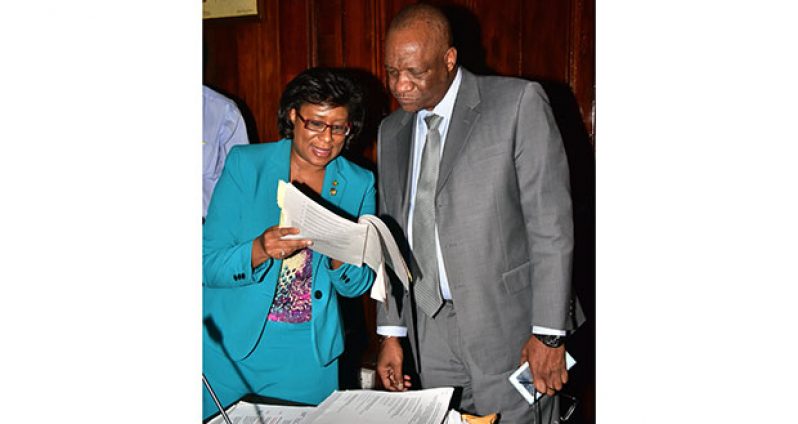— paves way for liberalisation of sector
By Alva Solomon
GUYANA’s telecommunications sector is now open for investment and enhancement following the passage, on Monday evening, of the Telecommunications (Amendment) Bill 2016, which has effectively liberalised the sector.First introduced in 2011 and revised in 2013, the Telecommunications Bill had been with a Special Select Committee in the 10th Parliament, and was near conclusion when that Parliament was prorogued in 2014 by the then President, Donald Ramotar.

After the APNU+AFC assumed Executive Office last year, the bill underwent a new set of consultations with GT&T, Digicel and other stakeholders, including the Private Sector Commission (PSC), the Public Utilities Commission (PUC), the University of Guyana (UG) and several non-governmental organisations.
The Opposition, People’s Progressive Party (PPP) had called for the bill to be sent to a Special Select Committee for further consideration, but Public Telecommunications Minister Catherine Hughes told Parliament on Monday evening that the bill has been long promised and is overdue.
She described the bill as “a most significant and tangible indication of commitment of the Government to progress and development of Guyana”, and said its passage is even as the administration recognizes the tremendous impact the telecommunications sector has on economies and countries around the world.
“This bill is a major breakthrough for the telecommunications sector in Guyana,” she declared, as she extended credit for its passage to members on both sides of the House, whom she noted worked tirelessly during the 10th Parliament to ensure that it was brought to Parliament.
She said Government recognises the potential of the Information and Communication Technologies (ICT) sector, which she noted as being a “transformational agent” for overall improvement of the citizenry, while building a 21st century economy.

“Critical to this improvement, therefore, is the creation of a telecommunications sector that is competitive and flexible enough to meet the needs of a modern, rapidly evolving technological environment,” she explained.
She said the transition is long overdue, and the sector must be an open one, so that the country can progress and not lag behind sister Caricom countries and the rest of the world.
According to Minister Hughes, the passage of the legislation provides for the fostering of an open, competitive telecoms sector in which investors will be attracted, and in which a fair, competitive environment for sector participants is created.
As regards consultations, she noted that the bill has seen extensive consultations through the work of the Special Select Committee.

Members of the committee included former Prime Minister Sam Hinds, who first took the bill to Parliament; Minister of State, Joseph Harmon; Minister within the Ministry of Social Protection, Keith Scott; former APNU Parliamentarian James Bond; former PPP MP Manzoor Nadir, and Opposition MP Irfaan Ali.
“The Special Select Committee conducted a holistic review of the bill,” Hughes said.
Speaking to the regulatory framework, she said that detailed regulations in seven areas will complement the bill. These include licensing, spectrum allocation, pricing, interconnection and access to universal services, telecoms and consumer-related matters, among other things.
Hughes said that the legislation will address the expansion of network in underserved areas in regions across Guyana.
Opposition MP Irfaan Ali called for the bill to be sent to a Special Select Committee. He said the local private sector should be considered when the new bill is implemented with what he deemed “stringent measures”.
Ali credited the PPP for piloting the bill and its conceptualization, and he listed the historical nature of the telecoms sector in Guyana.
In critiquing the bill, he noted that the legislation provides “wide sweeping powers” to the subject minister. According to him, while in committee, Foreign Affairs Minister Carl Greenidge was consistent in expressing his belief that the subject minister is being given enormous powers with the passage of the legislation.

But Minister Harmon, in supporting the bill, said there were many discussions on the powers of the minister as regards the bill, and he noted that in one instance it was even thought that the minister would not have much input into the sector when the legislation is passed.
He described the bill as historic, noting that it closes a chapter in which Guyana was the only country in Caricom which had a virtual monopoly of the sector. He said that prior to being voted into power, the APNU+AFC promised to provide a new regime for a liberalised and competitive sector, and one year after, the bill was brought before the House.
“This bill was brought to the House in 2010 by the previous administration. They took it to a certain point, passed it in this House, and then suddenly recognized that they needed to bring it back,” he said.
Harmon said the select committee sat on over 32 occasions from the time the bill was sent in November 2013, and there were significant refinements which were done at the level of the committee.
Greenidge told Parliament that the legislation is intended to allow more service providers to enter the market, thereby creating competition and offering more affordable packages to consumers.
The Telecommunications Bill has journeyed through years of intense deliberations and consultations, particularly with the two main mobile service providers in the country -– the Guyana Telephone and Telegraph Company (GTT) and Digicel Guyana.
The bill seeks to create a competitive regime in the telecommunications sector by providing for an open, liberalised and competitive sector that would be attractive to new market entrants and investors while preserving the activities of the current participants.
As it is, the bill is expected to result in greater choice, better quality of service, and lower prices to consumers. It also specifically addresses the expansion of telecommunication networks and services into unserved and under-served areas through the institution of new universal access/universal service programmes in an effort to further national, regional, social and economic development.




.png)









